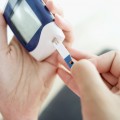Diabetes Complications: Dry Skin
Diabetes affects many body organs, including the largest of the body, the skin. Some skin conditions are specific to diabetes, but most of them also occur in the general population. In addition, the clinical symptoms and complications of skin disease are frequently more severe in the context of diabetes.
Dry skin (also called xerosis or asteatosis) is one of the numerous dermatological problems associated with diabetes. Although by no means the most serious complication of diabetes, you may find it extremely bothersome and problematic.
What is Dry Skin?
Rough, dry and scaly skin affects at least 75 percent of people with diabetes over the age of 64. Dry skin is aesthetically unappealing, uncomfortable, itchy and can set the stage for eczema like outbreaks and other skin infections. Dry skin covered with scale may appear in a generalized pattern or in localized round patches. In more severe cases, the skin loses its suppleness and cracks with erythema (redness or inflamation) becoming evident in and around the involved areas. Pruritus (itching) is the most prominent feature of this condition. Rubbing and scratching can aggravate dry skin, causing more itching and inflammation and potentially leading to infection. Dry skin can be localized such as on the legs, feet, hands and/or face or it can progress to all the skin.
The Causes
Dry skin is usually caused in large part by environmental factors. Although dry skin may be present in a person with diabetes year round, it is particularly present in the winter. When people turn on the heat in their houses, the indoor humidity decreases and there is also increased exposure to cold dry winds outdoors. Soaps, detergents, hot baths and showers remove the skin’s natural oils (sebum) and promote dry skin. When you run the water in your tub, keep the temperature cool to lukewarm.
In addition, in people with diabetes, damage to small blood vessels and to small nerves may further promote dry skin and its complications.
It is important to treat dry skin because:
- It can cause intense itching and irritation;
- It can lead to secondary infection, localized folliculitis (inflammation of the hair follicles on the skin) or even cellulitis
- It can lead to ulceration particularly on diabetic feet with loss of sensation.
- Daily treatment can prevent these problems and complications.
Treatment
Addressing the environmental factors is the foundation of treatment and prevention. This includes keeping the temperature as low as is comfortable and increasing the humidity through the use of humidifiers. The skin should be protected by wearing gloves when using cleaning agents, solvents and other household detergents. Bathing should be kept to a minimum and extremely hot baths and showers should be avoided.
Products such as Dove® unscented cleaning bar or Cetaphil® wash (a grease-free emollient) can be used for washing. After bathing, an appropriate emollient such as petrolatum, or products containing lanolin or Aquaphor can be applied in liberal amounts. A good skin tip is to blot yourself dry after showering or bathing, leaving some water on the skin. The emollient can then be applied to trap some of the moisture in the skin. To this regimen can be added to products containing 10 to twenty percent urea that can hold moisture in the skin. An alphahydroxy acid (AHA) lotion can often restore the structure and function of dry skin. Creams and lotions are generally preferred by people as they are less greasy and thus more cosmetically acceptable. Urea and lactic acid mixtures are often not well tolerated for dry skin on a sensitive area such as the face, and they may sting if applied on open areas (i.e. unhealed cuts or rashes). Products with emollient bases may be better alternatives.
If there are eczematous changes or infected areas associated with the dry skin, a family physician or dermatologist should be consulted as topical steroids or antibiotics may be necessary.
The “diabetic foot” is a special case in point, as it is very prone to infection and ulceration. Roughness, dryness and fissuring require prompt treatment to avoid more serious consequences. A similar regimen of emollient and urea-containing preparations can be use. The simple act of putting a cream or lotion on the foot daily also forces one to check the feet daily.
Daily treatment of dry skin is a highly recommended, necessary and cost-effective way of preventing further problems and complications.
Note: This article originally came out on our old site in 2013.













